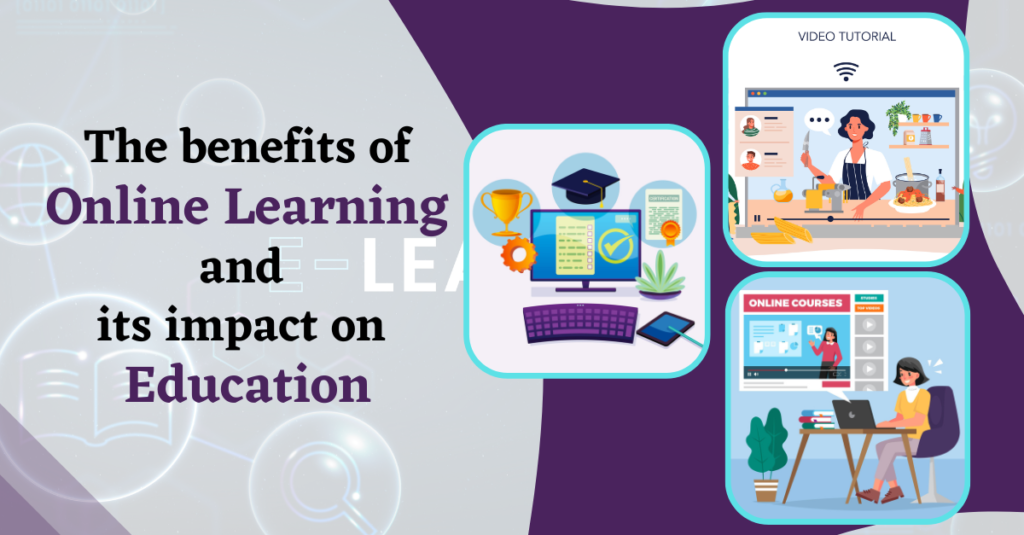Introduction
Online learning has grown in popularity as a method of acquiring knowledge and skills in recent years. Students can now access high-quality education from anywhere in the world, at any time, due to the internet and the proliferation of digital technologies. The use of technology to offer educational information and allow contact between teachers and students is referred to as online learning, often known as e-learning or remote learning. The term “online” in this sense can apply to a variety of digital platforms, including learning management systems, video conferencing software, and educational apps. Online education has changed the way education is offered by making it more accessible, flexible, and affordable. In this article, we will look at the advantages of online learning and how it affects education.
Advantages of online learning
There are various advantages to online learning, which have contributed to its growing popularity. Here are some of the main benefits of online learning:
Accessible to Everyone– One of the primary benefits of online learning is that it is available to everybody, regardless of geography or financial position. As long as you have an internet connection, you can access online courses from anywhere in the globe. This implies that students who live in remote places or can’t afford to travel to a real classroom can still get a good education.
Flexibility– Online learning is extremely flexible, making it suitable for students who have other responsibilities such as employment or family. Online courses are available at any time, allowing students to study whenever it is convenient for them. This means that instead of having to arrange their academics around their work or family obligations, students can fit their studies around their life.
Self-paced learning– Another benefit of online learning is that students can learn at their own pace. Conventional classroom learning is frequently geared to accommodate the average student, which means that some students may feel left behind, while others may find the content overly simple. Students can take as much time as they need to absorb the topic when learning online. This allows them to learn at their own pace while also ensuring that they fully comprehend the content before moving on to the next topic.
A broad variety of courses– Online learning provides a diverse range of courses, allowing students to find the course that best meets their requirements and interests. This is especially useful for students who live in places where specific courses are not offered. Online learning allows students to access courses from colleges all around the world, giving them a considerably broader selection of options.
Cost Saving– Online learning is frequently far less expensive than traditional classroom learning. Online courses do not have the same overhead costs as traditional classroom instruction, such as facility upkeep, utilities, and classroom materials. This means that online courses can be offered at significantly cheaper prices, making education more accessible to a broader spectrum of students.
Better technology– Online learning has benefited from technological advancements, which have enhanced educational quality. Multimedia, such as films and interactive simulations, are frequently used in online courses to make learning more engaging and effective. Furthermore, online learning platforms frequently use data analytics to analyze student progress and provide individualized feedback, allowing students to identify areas for improvement.
Better Cooperation– Online learning also allows for more collaboration between students and educators. Discussion boards and chat rooms are frequently included in online courses, allowing students to connect with one another and with their professors. This can assist students develop a feeling of community while also providing chances for peer learning and cooperation.
Career Advancement– Career progression is another advantage of online learning. Several online courses are designed to equip students with the knowledge and abilities they need to grow in their careers. This is especially useful for students who want to change occupations or learn new skills to improve their present work prospects.
Impact of online learning on education
Online learning has enhanced access to education, making it more accessible to learners all over the world, regardless of location, financial background, or physical ability. This has contributed to the narrowing of the educational attainment gap and increased enrollment in educational programs. It offers a broader selection of course alternatives and resources, including video lectures, interactive simulations, and virtual reality experiences. Another effect of online learning on education is the facilitation of global collaboration and knowledge-sharing among learners and educators. This results in a more diverse and inclusive learning environment, which can improve educational quality.
Conclusion
Thus, online learning has also had a huge impact on education, expanding access, making it more convenient and flexible, and encouraging collaboration and knowledge-sharing. While it has significant drawbacks too, its advantages indicate that it will continue to play an important role in education. Online learning will continue to evolve and improve the quality and accessibility of education for learners worldwide as technology progresses.
